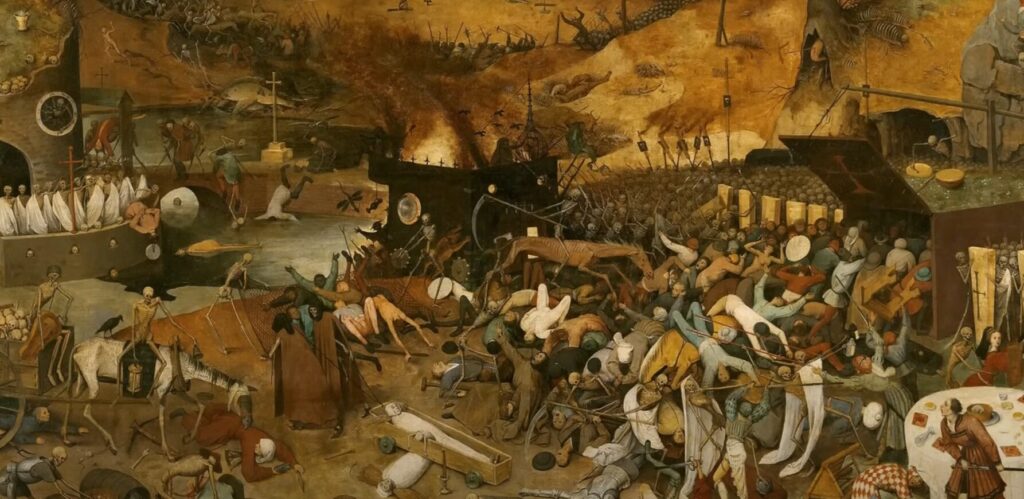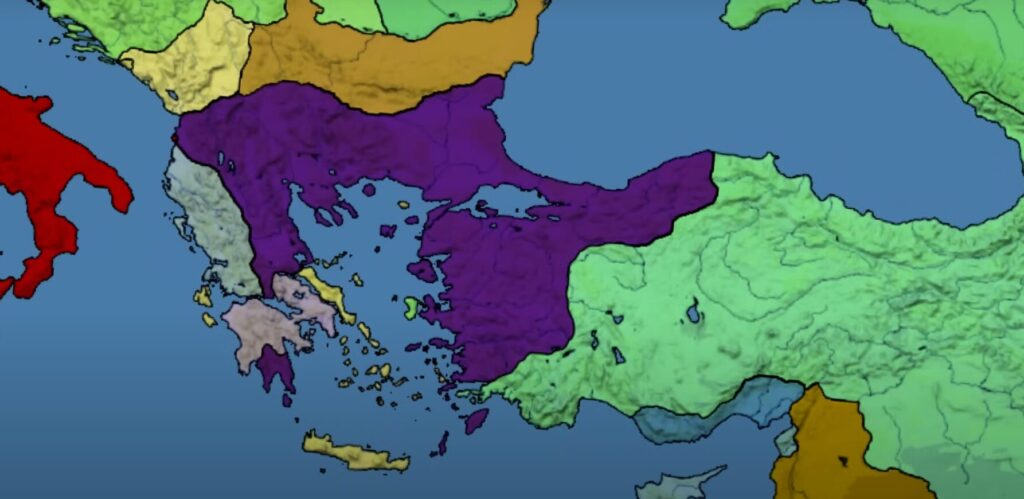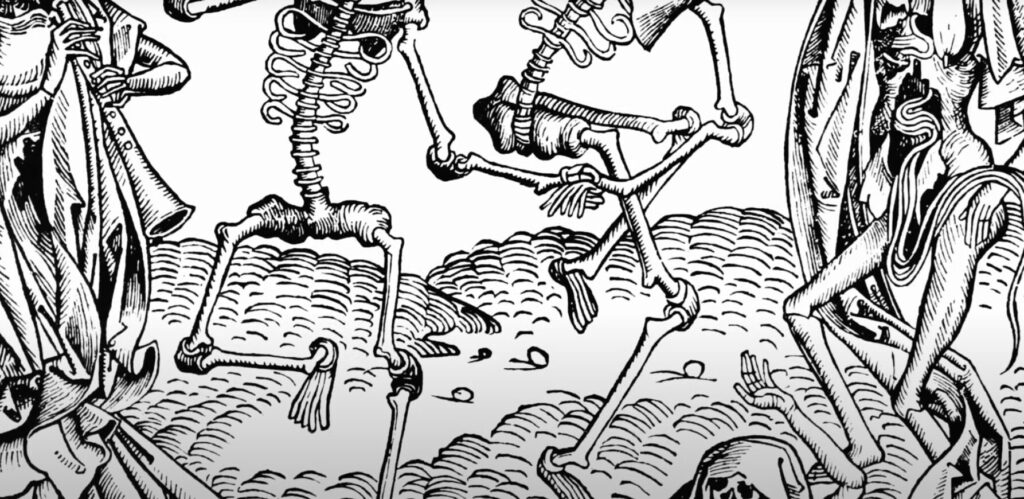In the late summer of 1347, merchant ships traveled between key trade ports in the Mediterranean and Black Sea. Among these stops was Constantinople, the capital of the Eastern Roman Empire, a state that had long struggled to regain its former power. At that time, the Eastern Roman Empire was facing challenges from both internal conflict and outside aggression, which had left it weakened and reliant on mercenaries with little true loyalty.
During this period, the Black Death began to spread across Europe and surrounding regions, bringing devastation wherever it appeared. In this alternate scenario, the Eastern Roman Empire was somehow granted total immunity to the plague. While their neighbors experienced major losses, the people within Eastern Rome’s borders remained safe from the deadly disease. This unexpected turn allowed the empire to consider opportunities for survival and even expansion that would have seemed impossible in their real historical situation.
Key Takeaways
- The Eastern Roman Empire was struggling before the arrival of the Black Death.
- In this scenario, they were the only society immune to the plague.
- Their unique immunity changed the empire’s future possibilities in important ways.
Past Challenges Facing the Eastern Roman Empire
Political Problems Before the Plague Arrival
In the years before the plague reached Europe, the Eastern Roman Empire was already facing many problems. Civil wars were common, with different groups fighting for power. Leaders struggled to hold the empire together while outside forces took over major areas, especially in Greece. The Serbian Empire, led by Stefan Dusan, conquered most of mainland Greece. Only a small section near Thrace and Constantinople was left under Eastern Roman control. This constant fighting made it hard for the empire to recover or grow.
Key Issues:
- Frequent civil wars
- Loss of territory to Serbians
- Weak central government
Main Lands Held and Population Around 1347
By 1347, the Eastern Roman Empire had shrunk to only a few main areas. Most of the land was in Thrace and the city of Constantinople. There were some islands in the Aegean Sea, but many were under the rule of other states like Venice and Genoa. Part of the Peloponnese was controlled by a loyal but mostly independent region called the Despotate of the Morea.
A summary of 1347 holdings:
| Region | Control Status |
|---|---|
| Thrace | Direct Eastern Roman control |
| Constantinople | Capital, still held |
| Aegean Islands | Few, most lost to Italians |
| Peloponnese (Morea) | Semi-independent, loyal |
The population dropped to about 4 million people. The empire’s army was small, being able to raise up to 10,000 troops at most. Most soldiers were not loyal natives, but mercenaries from other places.
Army Status and Use of Foreign Forces
The military was very weak compared to earlier centuries. Many of the soldiers in the army were foreign mercenaries—people from Italy, Slavic lands, and even Turkish regions. These men were hired for pay and not for loyalty to the empire. Local soldiers were few and had little money, which made it hard to trust the army in battle. The empire depended heavily on foreign city-states and warlords, sometimes having no choice but to bargain for their support.
Main features of the military in 1347:
- Heavy use of Italian, Slavic, and Turkish mercenaries
- Fewer native troops with poor equipment
- Dependence on foreign states for help
This decline in both land and military strength left the Eastern Roman Empire in a very weak and risky position just before the Black Death appeared in Europe.
The Coming of the Black Death

Movement Along Genoese Merchant Paths
In the summer of 1347, a ship from Genoa traveled across the Black Sea. These vessels stopped at busy ports to trade and get supplies, including the city of Constantinople. With them, they unknowingly carried a deadly disease that would soon strike much of Europe and Asia.
The ships connecting these cities played a big role in spreading the plague. As they visited places along the way, people and goods brought from Crimea to Italy carried the sickness. Because of these regular merchant trips, the illness reached many countries quickly. The network of trade routes was a key reason the infection spread so far and fast.
Key Ports Involved in the Spread:
| Port Name | Modern Country | Role |
|---|---|---|
| Constantinople | Turkey | Major trade hub |
| Messina (Sicily) | Italy | First western outbreak |
| Genoa | Italy | Merchant home base |
| Caffa (Crimea) | Ukraine | Starting point of journey |
Effects on Surrounding Societies
As the Black Death arrived, neighboring realms faced severe challenges. People reported strange and deadly illness all around the Eastern Roman Empire’s borders. Populations in places like Serbia, Bulgaria, and the Ottoman lands began to shrink. Soldiers and citizens became sick, and many died quickly.
Leaders in these areas could not respond fast enough. Armies grew weaker as more soldiers fell ill. Even simple tasks, like farming or selling goods, became harder as the sickness spread. This sudden disaster slowed down attacks and invasions into the small areas controlled by the Eastern Romans.
Main Results for Neighboring Kingdoms:
- Major drop in population due to the plague
- Loss of workers and soldiers
- Slower wars and territorial changes
- Panic and confusion in both cities and villages
As months passed, people started to notice the difference between lands struck by disease and those that were not. Bordering powers saw their strength fail just as the Eastern Roman Empire, by chance, seemed untouched inside its core lands.
Special Resistance of the Eastern Roman Empire
How Their Immunity Worked
The Eastern Roman Empire and its people could not catch the Black Death. This protection was total inside their borders, covering all citizens, no matter where in the empire they lived.
This unique protection had no scientific cause. It did not come from medicine, tradition, or precautions. It was sudden and absolute—a change with no explanation or warning.
Other groups inside the empire were not immune:
- Foreign travelers
- Mercenaries serving only for payment
- Non-local merchants
These groups still got sick from the plague just as they did elsewhere.
Conditions and Restrictions
Immunity was tied to citizenship and sincere loyalty to the empire. The rules were simple:
- Only those truly loyal to the emperor and his culture became immune.
- The oath of loyalty had to be genuine, not fake or self-serving.
- After swearing loyalty, even someone already sick was cured quickly.
- Once loyal, a person could leave the empire’s borders and keep the immunity for good.
People who stayed for trade or just for money, with no real loyalty, were not protected. This meant the empire had to be careful when expanding or using foreign help.
Effects on Outsiders and Those Who Switched Sides

The immunity rules changed how outsiders and defectors experienced the Black Death. Here is a clear breakdown:
| Group | Immune? | Notes |
|---|---|---|
| Local citizens | Yes | Complete immunity while inside the empire |
| Foreign travelers/visitors | No | Still affected by the plague |
| Mercenaries (for hire only) | No | Not immune unless they switched loyalty |
| Defectors (loyal to emperor) | Yes | Gained instant and lasting immunity |
If a foreigner took a real oath of loyalty to the Eastern Roman emperor—accepting the culture and making it their own—they became immune. Even better, if they were already infected, they would be cured right away.
Foreigners who just visited or did trade without true commitment stayed at risk. Only true loyalty changed their fate regarding the plague.
Direct Consequences Inside Imperial Lands
First Responses to the Outbreak
At the start, the people living within the empire did not know about the deadly sickness spreading in other regions. They were caught up in their own problems, like fighting with the Serbians and surviving major losses in land. When stories of the sickness started to come in from deserters, sailors, and traders, fear spread quickly. Many expected the plague would soon arrive and harm the population, leading to worry and confusion.
Recognition of Disease Resistance
After some time, people noticed something strange. Even as the disease was wiping out foreigners and sweeping across nearby lands, no Greek citizen loyal to the empire showed signs of the sickness within their borders. Weeks and months went by, but the native population stayed healthy. Foreigners and mercenaries, especially those not tied to the emperor, continued to get sick or die, but regular citizens did not. This led many inside the empire to realize that, for some unknown reason, they could not catch the plague within imperial territory.
| Group | Effect of Plague |
|---|---|
| Eastern Roman citizens | No cases, no sickness |
| Foreign merchants | Still affected or died |
| Loyal defectors | Became immune instantly |
Community Life and Financial Order
Life inside the empire could continue with less fear of sudden outbreaks. Shops stayed open, and farms kept producing food, so there were fewer shortages and less unrest than in other regions. Though the empire was poor and small with a weak army, the fact that its people were not dying kept its social order steady. Local leaders did not have to manage large outbreaks or mass burials, which meant the economy and daily routines stayed more normal compared to the chaos outside their borders.
Key Points:
- Less disruption in trade and farming than neighboring lands
- No loss of workforce due to disease among loyal citizens
- Fewer food shortages or panic within city markets
- Little need for emergency measures inside the empire
Effects on Foreign Affairs for the Eastern Roman Empire

New Openings for Territorial Growth
The sudden immunity of the Eastern Roman Empire to the Black Death set it apart from its neighbors. While others struggled with sharp declines in population, lost leaders, and empty towns, the empire’s people stayed healthy. Local rulers, soldiers, and merchants in nearby states became desperate, with many dying or forced to flee. Those who looked for safety might choose to join the Eastern Romans, swearing loyalty and becoming immune.
More people and territory could join the empire as a result.
- Small kingdoms weakened by the plague might ask for protection.
- Foreigners could become citizens if they pledged loyalty and left their old lands.
- Some enemy soldiers might even switch sides to survive.
| Neighbor | Effect of Plague | Possibility of Joining Eastern Rome |
|---|---|---|
| Serbia | Lost many troops | Desertion to empire for immunity |
| Bulgaria | Severe depopulation | Citizens seek refuge, may join |
| Ottomans | Halted conquests | Weaker threat along borders |
The empire could use this chance to recover lost lands and take new regions with less fighting.
Changes Among Local Rulers and Nations
As the Black Death spread, the balance of power in the region shifted. Other rulers found it hard to keep order, raise armies, or collect taxes. Eastern Rome, with a stable population and army, was in a stronger spot.
- Rivals became weaker, losing their ability to control their lands.
- The empire, unaffected by the plague, looked stronger in comparison.
- Neighboring cities and lords, seeing the stability, may choose to become allies or even subjects.
The empire could even set terms and make demands that would have been impossible before.
It gained respect and fear among its neighbors, just by being unharmed while all around suffered heavy losses.
New Roles in Trading and Peacekeeping
Trade routes in Europe and Asia slowed as the plague wiped out merchants and craftsmen. But Constantinople, the capital, remained open and busy.
- Other trading centers closed due to illness and death.
- Byzantine markets kept drawing business as the only safe place.
- Foreign traders, wanting to survive, might settle or work with the empire, even swearing loyalty for safety.
This healthy position let the empire control key goods and routes in the region.
Trade profits increased while rival ports suffered losses.
The empire also gained a bigger say in settling disputes, as it became the center for people seeking protection and stable markets.
Other states needed to negotiate; the empire could offer help or demand rewards in return for allowing trade or passing through their lands.
Long-Range Effects and What Might Have Happened Differently
Chance for Empire Restoration
The absolute immunity of the Eastern Roman Empire to the Black Death would create a major difference in its destiny. While neighbors lost millions to the plague and saw their armies, economies, and leadership weaken, Eastern Rome’s people and resources would stay strong. The empire’s borders would be less threatened since rival states like the Ottomans, Serbians, and Bulgarians would lose population and face chaos from the plague.
Eastern Rome would likely have a rare window to rebuild its strength. No longer weighed down by huge losses, the empire could start to regroup, reform its army, and maybe even reclaim lands lost to its rivals. Defectors and refugees from other regions could be welcomed if they swore real loyalty to Eastern Rome, growing the population and military.
The following changes would become possible:
- Population Growth: As people from outside join and become immune, the empire’s numbers and skills increase.
- Military Expansion: A growing native army could make them less dependent on untrustworthy foreign mercenaries.
- Political Stability: Less outside pressure and fewer internal losses mean more time to fix old problems and plan for the future.
| Before Black Death | With Plague Immunity |
|---|---|
| Losing land to neighbors | Chance to regain lost ground |
| Declining population | Opportunity to welcome new people |
| Dependent on mercenaries | Forming a stronger native army |
Influence and Cultural Shift
Surviving and even thriving while others suffer would make the Eastern Romans seem almost blessed or chosen. This could change how people inside and outside the empire saw its place in the world.
The loyalty oath that gives plague immunity might spark new traditions and a sense of identity for those who join. Newcomers would adopt the culture, language, and religion of Eastern Rome, changing and expanding what it meant to be Roman. Over time, this mix of old citizens and new converts could make society more diverse, with customs blending together.
Possible changes include:
- Shifts in Language and Customs: Refugees from across Europe and the Middle East would learn Greek and start following Roman ways.
- Influence on Art and Education: The empire’s unique status would draw in artists, scholars, and craftsmen hoping for a fresh start.
- Religious Impact: Being seen as protected from the plague could lead to a boost in the empire’s religious confidence or even claims of divine favor.
The long-term effect would be not only survival, but also transformation of the empire’s social and cultural identity. The Eastern Roman Empire might come to stand as a symbol of hope and strength during a time when most of the world faced disaster.
